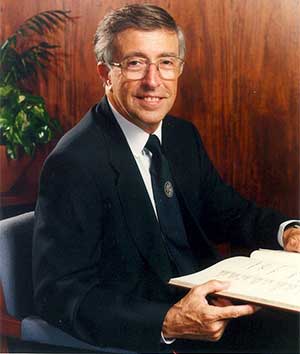David (Den) Davies became one of the most influential engineers of his generation, advising the government on some of the most sensitive political and defence issues in modern times. He also made important technical contributions to the development of radar and communications and to higher education policy as vice chancellor of a university renowned for its engineering focus.
He is best known for his report to the Deputy Prime Minister on the options available to improve the safety of rail travel in the wake of the disastrous train crash at Ladbroke Grove in October 1999, which killed 31 people and injured many more. Sir David’s reasoned, technically robust report, published in February 2000, provided a voice of calm in the clamour for immediate action. He showed that the cheaper and less technically advanced train protection and warning system that the rail industry was already installing network-wide would save more lives over 20 years than the far more expensive automatic train protection systems. These were still essential for high-speed lines but would take at least 10 years to fit to the entire network. His recommendations were endorsed by the ensuing public inquiries. He was later asked to become Chair of Railway Safety, a new company set up to promote and oversee rail safety issues.
Sir David pursued his interest in defence after stepping down as Chief Scientific Adviser to the Ministry of Defence (MoD), serving as Non-Executive Chair of the Defence Evaluation and Research Agency from 1998 to 2000 and later Chair of the MoD Nuclear Research Advisory Council.
His research work in antenna arrays, radar, signal processing, and optical fibre was highly regarded – he won the Rank Prize for optoelectronics in 1984 and the Institution of Electrical Engineers’ (IEE) Faraday Medal in 1987. He was elected to the Fellowship of Engineering in 1979, as a Fellow of the Royal Society in 1984, and was awarded a CBE in 1986. He was President of the IEE in 1994-95 and has served on the committees of many national bodies, including the BBC Engineering Advisory Committee and the Royal Society’s Science Inquiry Committee.

Sir David Davies
- 1935 Born 28 October in Cardiff
- 1960 Graduates in electrical engineering from the University of Birmingham and stays on to research for a PhD, later joining the staff
- 1965 Participates in staff exchange as Senior Principal Scientific Officer at the Royal Radar Establishment, Malvern
- 1967 Becomes Assistant Director of Research, British Railways Derby
- 1971 Appointed Professor of Electrical Engineering, University College London, later serving as Vice-Provost
- 1988 Appointed Vice Chancellor, Loughborough University
- 1993 Becomes Chief Scientific Adviser to the Ministry of Defence
- 1994 Knighted for services to science
- 1996 Appointed President of the Royal Academy of Engineering
- 1999 Commissioned to advise the government on automatic train protection
- 2000 Appointed Chair, Railway Safety Ltd
- 2002 Appointed Chair of the Hazards Forum
